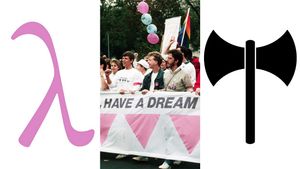Treatment GuideJust DiagnosedSex & DatingAfrican AmericanStigmaAsk the HIV DocPrEP En EspañolNewsVoicesPrint IssueVideoOut 100
CONTACTCAREER OPPORTUNITIESADVERTISE WITH USPRIVACY POLICYPRIVACY PREFERENCESTERMS OF USELEGAL NOTICE
© 2025 Pride Publishing Inc.
All Rights reserved
All Rights reserved
By continuing to use our site, you agree to our Privacy Policy and Terms of Use.
'You have breast cancer.' No woman ever wants to hear those words. But for a woman who lives each day with the knowledge that she is HIV-positive, a diagnosis of breast cancer can seem like an especially cruel twist of fate. Terri knows this all too well. After living with HIV for eight years, she was diagnosed with breast cancer in March at the age of 42. 'The breast cancer was in some ways harder to handle,' says Terri, who requested that her real name not be used. 'When I was diagnosed with HIV, the doctors said to me, 'This is what you have to do,' and I did it. With breast cancer, the doctors couldn't do that. They said, 'These are your options.' And they sent me off with a lot of information.' Only a small number of HIV-positive women have been diagnosed with breast cancer. In fact, as of December 2001, only 36 cases had been reported. But HIV specialists and oncologists say this number is sure to grow as the proportion of women with HIV increases and as the population of HIV-positive women ages, since breast cancer risk increases with age. Early in the HIV epidemic it became clear that HIV-positive men and women were at higher risk for developing certain cancers, like lymphoma. But no such relationship exists between HIV and breast cancer. 'HIV does not cause breast cancer,' explains Bruce Dezube, MD, an associate professor of medicine at Harvard Medical School. 'It's what we in the medical profession call a true unrelated, as when someone has two illnesses, like measles and a broken leg, which don't have anything to do with each other. People get HIV and people get breast cancer.' Experts say the fact that a woman is HIV-positive should not in and of itself determine the type of treatment she receives. 'A woman with breast cancer should get the exact same treatment as a woman without HIV,' says Dezube. 'And their doctors should follow the exact same treatment guidelines that they would use for a woman who is HIV-negative.' But, Dezube adds, women with HIV do face some unique concerns. Left Out of the Loop Terri, who is asymptomatic, says her doctors treated her as they would any other woman with breast cancer. But she says she found it frustrating that she could not find any information specifically on women who had both HIV and breast cancer. 'I looked on the Internet and couldn't find anything,' she says. 'When I called people, they said they had information on cancers associated with AIDS. And then I had to explain to them that that's not what I had.' The type of tumor a woman has and the cancer's stage at diagnosis determines breast cancer treatment. (Staging is based on whether the cancer has spread beyond the breast to the lymph nodes or to other areas of the body.) The typical treatment regimen involves surgery, chemotherapy, and radiation. Women whose tumors are estrogen-receptor positive, which means they are fueled by the female hormone estrogen, may also be offered hormonal therapy'drugs that work to keep estrogen away from breast cells. If possible, doctors say, women with HIV should be treated at a major cancer center. They also recommend that women work with both an HIV specialist and an oncologist to develop a cancer treatment plan. This is important because many oncologists are not knowledgeable about antiretroviral medications. The most important drug for oncologists to be aware of is AZT. 'Patients with HIV who are going to be treated with chemotherapy cannot be on AZT (Retrovir) or any drugs that contain AZT, such as Combivir and Trizivir, while receiving chemotherapy,' explains Dezube. 'AZT affects the bone marrow reserve, which is where you mount an immune defense. And chemotherapy lowers the white cell count, which makes you more susceptible to infection. So it is a bad combination.' When the immune system is challenged in this way, it can cause additional problems for people with HIV. In his own practice, Basil El-Rayes, a hematology/oncology fellow at the Karmanos Cancer Institute in Detroit, has had two patients whose HIV progressed while being treated with chemotherapy. He says he has found, though, that 'the introduction of more effective antiretroviral therapy over the past several years and better control of HIV as a disease has helped in delivering chemotherapy. If the HIV is under control, the delivery of chemotherapy to patients is much easier.' The Riskiest Business But not everyone who develops breast cancer is on antiretroviral therapy or has their HIV under control, as Judith Hurley, MD, an assistant professor in the division of hematology and oncology at the University of Miami in Florida, knows all too well. Between January 1988 and August 2000, Hurley treated 20 HIV-positive women with breast cancer, most of whom were not on any anti-HIV medications. Some were not on medication because they were diagnosed with breast cancer before 1996, during the pre-HAART era. Others were not on treatment because, like the majority of those she sees, they were uninsured, used drugs, or had other problems that interfered with their getting or adhering to treatment. Some of Hurley's initial breast cancer patients did not do well. 'We had a lot of catastrophic occurrences,' she says, 'including women who died from chemotherapy or in whom chemotherapy seemed to make their HIV worse. And that was regardless of whether or not they had a good CD4 count.' In response, Hurley changed her typical cancer treatment regimen. Now she is more likely to recommend hormonal therapy over chemotherapy for her patients with estrogen-receptor-positive tumors. And for women with ER-negative tumors, she will typically select less-toxic chemotherapy drugs. 'Because there are so few women who have been treated, this is all based on my own experience,' she says, 'but what it really is about is tailoring the treatment to the patient.' Some researchers have suggested that based on current statistics, women with HIV may actually be at lower risk than other women for developing breast cancer, because of how HIV interacts with breast cells. To further explore this question, Susan Preston-Martin, Ph.D., a professor in the department of preventive medicine at the University of Southern California, is comparing breast cancer risk factors of HIV-positive women with those of a comparable group of HIV-negative women. 'You have to really do the analysis very carefully,' she explains. 'It may be that women with HIV are at decreased risk, but that may not be because of their HIV but because of their age or socioeconomic status or other things that relate to breast cancer risk. Women with a greater risk for breast cancer tend to be higher social class, have a higher education, and are white, and women with HIV are less likely to be those things.' Help Yourself and Others Whether HIV-positive women are at decreased risk for breast cancer or not, experts agree that it is important that they know the basics of breast care. 'Now that people are living with HIV longer,' says Preston-Martin, 'they need to get into the mainstream in terms of preventive care recommendations.' This begins with becoming familiar with how one's breasts feel. This doesn't mean doing a formal breast self-exam every month'just knowing what is normal makes it more likely that a woman will notice something unusual. It includes having a thorough clinical breast exam by an ob-gyn or internist at least once a year. And it requires a woman discussing with her physician when she should begin annual mammography screening. Necessary to help women and oncologists alike, El-Rayes says, is 'for physicians caring for HIV-positive patients to report their cases' in medical journals 'because that is the only way that we will be able to build experience in this field.' Even more important, though, is getting the word out to women about the need to seek care if they notice anything wrong. 'Breast cancer is not necessarily a terminal condition for a woman who is HIV-positive,' says Hurley. 'It can be cured, and patients can go on to live their life and just deal with HIV infection.' That is just what Terri is doing. 'With breast cancer treatment,' she says, 'there is an end to it. But with HIV there is no end. So you just have to get on with it. It's life. And you have to have a sense of humor. My husband has HIV and hepatitis C,' she continues. 'So he has always been one up on me on diseases. But now I am one up on him. So I'll giggle and say to him, 'Why don't you get a real disease?' '
From our Sponsors
Most Popular
BREAKING: Supreme Court rules to save free access to preventive care, including PrEP
June 27 2025 10:32 AM
Thanks to U=U, HIV-positive people can live long, happy, healthy lives
July 25 2025 2:37 PM
The Talk: Beyond the exam room
August 13 2025 3:15 PM
Plus: Featured Video
Latest Stories
Amazing People of 2025: Javier Muñoz
October 17 2025 7:35 PM
It’s National PrEP Day! Learn the latest about HIV prevention
October 10 2025 9:00 AM
“I am the steward of my ship”: John Gibson rewrites his HIV narrative
September 16 2025 2:56 PM
“So much life to live”: Eric Nieves on thriving with HIV
September 03 2025 11:37 AM
The Talk: Owning your voice
August 25 2025 8:16 PM
The lab coat just got queer
August 21 2025 10:00 AM
Messenger RNA could be the key to an HIV vaccine — but government cuts pose a threat
August 20 2025 8:02 AM
The Talk: Navigating your treatment
August 01 2025 6:02 PM
The Talk: Starting the conversation
July 25 2025 4:47 PM
How the Black AIDS Institute continues to fill in the gaps
July 25 2025 1:06 PM
“I felt like a butterfly”: Niko Flowers on reclaiming life with HIV
July 23 2025 12:22 PM
Dancer. Healer. Survivor. DéShaun Armbrister is all of the above
July 02 2025 8:23 PM
1985: the year the AIDS crisis finally broke through the silence
June 26 2025 11:24 AM
VIDEO: A man living with HIV discusses his journey to fatherhood
June 10 2025 4:58 PM
Trump admin guts $258 million in funding for HIV vaccine research
June 03 2025 3:47 PM
Grindr is reminding us why jockstraps are so sexy and iconic
May 02 2025 5:36 PM
HRC holds 'die-in' to protest Trump health care cuts
April 28 2025 2:11 PM
Two right-wing Supreme Court justices signal they may uphold access to PrEP and more
April 21 2025 4:10 PM



































































